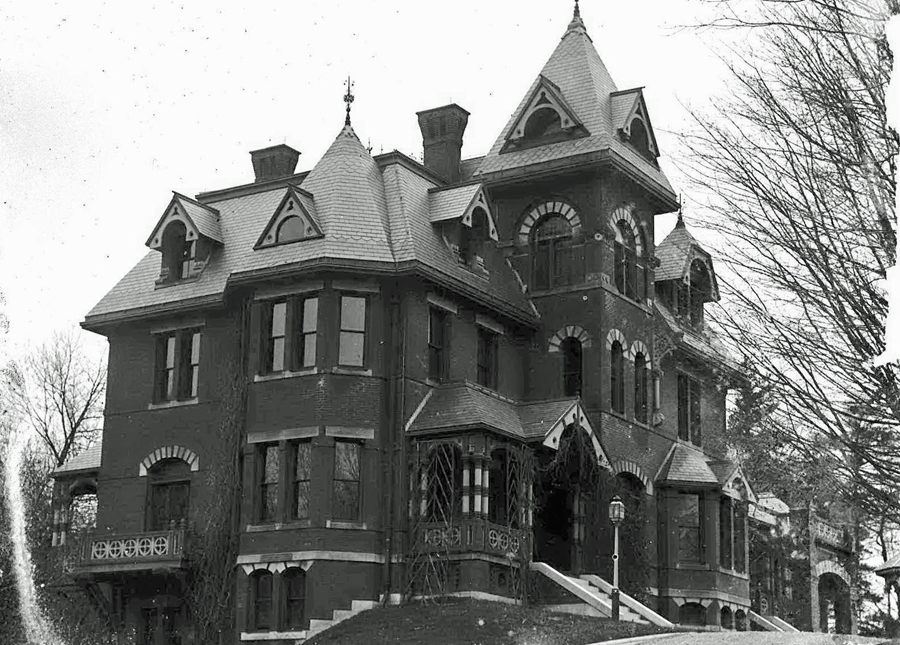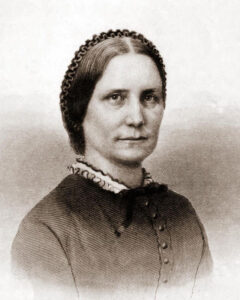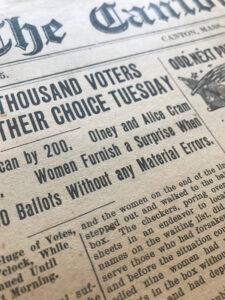True Tales from Canton Past: New Vistas for Women
By George T. Comeau
The earliest suffragists’ discussions were held in the Morse mansion on Washington Street. (Courtesy of the Canton Historical Society)
The seeds of a woman’s right to vote were sown in many places across New England. In Canton, they began at the stately home of Congressman Elijah Morse. As Mary Livermore alighted from her carriage on Washington Street, she looked over the ground of the mansion Morse had built. Morse was extremely wealthy and drew an annual salary of over $100,000 a year from his factory within a short distance from his home. These were pivotal early years in the fight for women’s rights and Morse brought influential advocates for the cause to his hometown to stir the dialogue. Eighteen-ninety-six had been a very busy year for the women leading the Suffrage Movement. And as the congressman who had served as chairman overseeing the question, Morse was uniquely situated to support the cause. Canton responded in a rather lukewarm manner.
Morse was quite influential, and while a Massachusetts state senator, in 1887, he took the stage at the annual convention in Boston to support equal suffrage rights alongside Julia Ward Howe, Lucy Stone and William Lloyd Garrison. Morse, however, would not live to see the ratification or the passage of the 19th Amendment. That would come many years after he passed away. But when Morse invited Livermore, along with a lesser known pioneer by the name of Elizabeth Yates, to Canton, he began a conversation that would ensue for 24 more years. And this year we celebrate the 100th anniversary of a woman’s right to vote.
There were high points and low points in the struggle. Twice, women’s suffrage was put to the Massachusetts voters and both times it was defeated. In 1895, women were permitted to vote along with men on a non-binding referendum to gauge public opinion on enfranchising women in municipal elections. Only 4 percent of eligible women voters participated, but they overwhelmingly voted in favor of the measure. Sixty-eight percent of the male votes were cast against. Women’s suffrage went down in defeat again in 1915. Massachusetts had one of the country’s strongest anti-suffrage groups, the Massachusetts Association Opposed to the Further Extension of Suffrage to Women. In fact, Mrs. Matthew Sullivan of Canton was a prominent voice against women’s right to vote. Sullivan spoke at many anti-suffrage conventions and presented her paper, “The Average Woman.” In looking for local heroes in the movement, none can be found.
By 1920, the end of the long battle drew to a close. In late February the Canton Journal shared a speech with its readers by Mrs. Henry W. Peabody. “American women, while retaining all the feminine virtues, have stepped from the fireside into the world arena, placing the mother craft of the United States at the disposal of humanity … The war ‘discovered’ women, it proved their capacity for responsibility and their executive ability in numerous fields.” Another story ran later that year with the headline “Modern Woman is Superior to Grandmother,” setting the premise that “the woman of today is intellectually and physically superior to her grandmother of the ever-ready blush and the downcast eye. Her latchkey is the badge of her emancipation, she is no longer the wooed but the wooer. She has and exercised the right to select her own mate.”
And right here in Canton, 700 women had already enjoyed a limited right to cast votes for School Committee for a handful of years. They were not allowed to vote on any other offices other than the school board, likely only insomuch as the school held sway over their children and so their opinion was required but limited in scope.
Things changed radically with the ratification of the Suffrage Amendment. The state to tip the scales was Tennessee. The local paper, which was supportive, wrote a short opinion article: “The female vote is an unknown quantity and will keep the whole country guessing until the vote is finally declared. The tactics employed to coerce the legislatures of several states, if taken as an indication of the way the female vote will be cast, must cause a feeling of uneasiness to the earnest voter.”
The vote came in August, and another Canton headline and story spread the word: “The ratification of amendment by Tennessee gives every registered woman the right to vote. Some 1,400 women in Canton have the privilege of equal suffrage, since the Tennessee legislature ratified the suffrage amendment last Wednesday. They are now on the same voting basis as the men, and can vote at all elections and primaries. The only qualification necessary is that they are registered voters. All women who have registered in the past to vote on the school committee tickets are eligible.”
Three weeks went by and there was general confusion on the issue. And why not? The news was relegated to page 6 of the newspaper. The paper noted that “Women Should Register Now” as a headline. “All women who had registered for school committee before the passage of this act, and all those who have so registered since the passage of the act, will have their names automatically transferred to the regular voting list without re-registration, upon the completion of the ratification of the federal suffrage amendment. This will entitle them to vote, not for school committee alone, but at the primaries and all national, state and local elections within the Commonwealth, and for all officers from the President of the United States to the field viewer. Women will not be obliged to pay the five dollar poll tax required of men. Many women are failing to register because of the belief that the poll tax would be exacted.”
Then the question of annual town meeting loomed: “With the vote of the women added to that of the men in Canton, there will have to be some radical change in the town meeting system if everyone is interested in town affairs takes part in the deliberations. The women are as much entitled to a seat in Memorial Hall on the night when the annual appropriations are made as are the men, but how the Selectmen are to arrange to seat over 2,000 voters in a building whose seating capacity is less than 900, is causing quite a little anxiety. In the years past the gallery has been reserved for women and spectators and is usually filled to capacity, and the floor of the hall has had but little if any vacancies. And now with over 800 more voters added to the list, the question must be met fairly and squarely. The law gives a woman just the same right the man has had and according to all indications they propose to use that right at any cost. There are many who claim the woman voters will refrain from participating in the annual meeting, but any woman who is interested in her home and children will probably be on the watch to see that everything that comes up does not in any way reduce the privileges of her family. The female vote will decide many questions in the annual meeting and we confidently look to see a retrenchment in many of the expenditures of the town.”
The first opportunity to vote in Canton came on Tuesday, September 7 — the presidential primaries — and 210 voted, 50 of whom were women. Thirty-one women had registered and the paper noted that “the women are displaying quite a little interest in their newly acquired rights, and many opposed to suffrage heretofore, have signified their intention of registering, and availing themselves of the privilege so afforded.”
That was also the year of the annual Census, and yet another progressive change was afoot.
The term “housewife” became “house manager” on the registration sheets with the intention of “giving women the labor status she deserves in this industry.” But a biting comment came along with the change: “How many [women] understand the conservation of energy and know the most efficient message for accomplishing household labor, or can demand and secure such conservation and efficiency in those who work for them? A steadily increasing number of women undoubtedly deserve the new title, but the majority of them have much to learn. The latter will find new vistas of interest and freedom opening up to them, if they will become managers of their homes in fact as well as in name.” Ouch!
Finally, the real answer as to whether women would find new vistas came in the November elections. The headline in the Canton paper read, “Women Furnish a Surprise When They Cast over 900 Ballots Without any Material Errors.” And they were watched like hawks. The vote that day started at 5:45 a.m. and completed at 5:30 p.m. A total of 1,985 men and women voted, and of the voters, 90 percent of the total registered female vote turned out — and 85 percent of the men cast ballots.
Females had won the rights, and they exercised them. “The women marked their ballots with accuracy that was surprising.” And, under the watchful eye of the men, they “showed their familiarity with the requirements by marking their ballots with unexpected promptness.” At one point, the lines to check out were so long that nine women broke the line and walked up to the ballot box and deposited their ballots without checking out and “departed for parts unknown.” This caused a major consternation and it took the “men” until 2 a.m. to reconcile the final count. And there is a final footnote: There was a woman on the ballot and she was elected state auditor. The vote in Canton was decisive as she edged out her opponent by 48 votes — no doubt as a result of the woman’s right to vote. Women were being heard.
Short URL: https://www.thecantoncitizen.com/?p=66792












